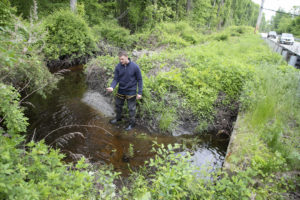Mosquito Control: Still Important to Eliminate Standing Water in Late Summer
Published on August 26, 2019
Number One Tool to Battle Mosquitoes: Remove Standing Water
Even though we are in the later days of summer, it is not time yet to let down your guard regarding the battle against pesky and disease carrying mosquitoes, according to the Morris County Division of Mosquito Control.
The county's mosquito control teams continue to attack wet and swampy areas of the county to treat and eliminate breeding grounds for mosquito larvae, and they are engaged in spraying in communities that are hardest hit by mosquitoes.
 (JPG, 54KB) A Morris County Mosquito Control employee sets a mosquito trap that uses dry ice as bait. Captured mosquitoes are identified and counted to determine the treatment method and severity of infestation.
(JPG, 54KB) A Morris County Mosquito Control employee sets a mosquito trap that uses dry ice as bait. Captured mosquitoes are identified and counted to determine the treatment method and severity of infestation.
While those efforts can pay major dividends in minimizing infestation in some of the county's wettest areas, the county's individual property owners have the ability to make a major difference in reducing mosquitoes to a tolerable level around your homes or apartments.
In addition to being a nuisance, mosquitoes also bring the possibility of diseases such as West Nile Virus, Eastern equine and St. Louis encephalitis, which are transmitted through mosquito bites.
You can reduce the number of mosquitoes in your own backyard, including the aggressive Asian Tiger variety, by eliminating all standing water on your property. Following all of the recent rain that has occurred in the county, it's a good time to check for stagnant water in containers like planters, children's toys, birdbaths, clogged gutters, wheelbarrows, trash can covers, tarps, old tires, construction materials, or unused swimming or wading pools.
A wheelbarrow filled with water, for example, can result in the infestation of an entire neighborhood. An untended pool can produce a million mosquitoes over the summer. A single soda cap of water can produce 200 mosquitoes every week.
We can use your help,'' added Morris County Mosquito Division Superintendent Kristian McMorland. If everyone would take steps around their own homes to eliminate standing water, it could reduce the number of mosquitoes by many hundreds of thousands, if not millions, where you live.''
Mosquitoes spend their juvenile life stage in the aquatic environment and go from egg to adult in about one week during the summer. Since many mosquitoes travel only 1,000 feet from where they spawn, eliminating pockets of water on your property can dramatically improve your own outdoor quality of life, he said.
County crews are scheduled to spray this week at locations in Dover, Jefferson, Morris Township, and Roxbury. Visit https://morriscountynj.gov/mosquito/for the upcoming spraying schedule.
 (JPG, 1MB) Biologist John Rosellini checks out a potential mosquito breeding ground
(JPG, 1MB) Biologist John Rosellini checks out a potential mosquito breeding ground
Steps you can take to reduce mosquito populations include:
- At least once a week, empty water from flowerpots, pet food and water dishes, birdbaths, swimming pool covers, buckets, barrels, and cans;
- Check for clogged rain gutters and clean them out;
- Poke holes in trash cans and recycling containers;
- Recycle discarded tires, and remove other items that could collect water;
- Check for containers in places that may be hard to see, such as under bushes or under your home;
- Aerate ornamental pools or stock them with fish like fathead minnows;
- Do not allow water gardens to stagnate;
- Clean and chlorinate swimming pools, including those not in use (mosquitoes may even breed in water that collects on pool covers);
- Dispose of cans, plastic containers, ceramic pots or similar water-holding containers that have accumulated on your property
For more details on mosquitoes, visit: https://morriscountynj.gov/mosquito/info/
Also, check out the following videos for good advice on dealing with mosquitoes: https://www.youtube.com/watch?v=G_ekfQ-F4F4 or https://www.youtube.com/watch?v=eiQXLZnU7lA